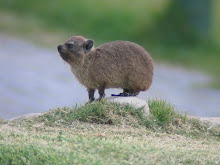- Ta itu med HIV epidemin i ett land där kanske så många som var femte person bär på viruset.
- Ge sig i kast med den andra stora epidemin i landet; fetma. Där ca 70 % av befolkningen är alltingen överviktiga eller feta (siffror som är i klass med USAs), och vilket leder till många följdsjukdomar, såsom diabetes.
- Bekämpa utbrott av multiresistent tuberkulos, som hem- söker rurala städer/byar i landets tätbefolkade östra delar.
- Vara väl rustad för utbrott av tropiska sjukdomar såsom malaria, särskilt nu när klimatzonerna håller på att förflyttas.
- Komplettera och/eller konkurrera ut urålderlig medicin- kunskap, som ofta gör mer skada en nytta i samband med hälsovård.
- Hålla en hög standard på sjukvården i ett land som har över 25 000 mord varje år (och mångfaldigt fler mordförsök) och där man en vanlig helg kan bevittna hundratals falla offer för rattonykterhet.
Jag önskar Barbara ett stort lycka till. You will need it…
PS. Apropå ministrar i Sydafrika så minns jag ett roligt skämt från tiden före 1994 (gör sig bäst berättat på engelska).
A Zimbabwean and a South African were sitting and discussing what ministers their countries had. The South African was surprised to hear that the landlocked Zimbabwe had a minister of maritime. The Zimbabwean replied: “It is not that strange. You have a minister of Justice…”
DN



